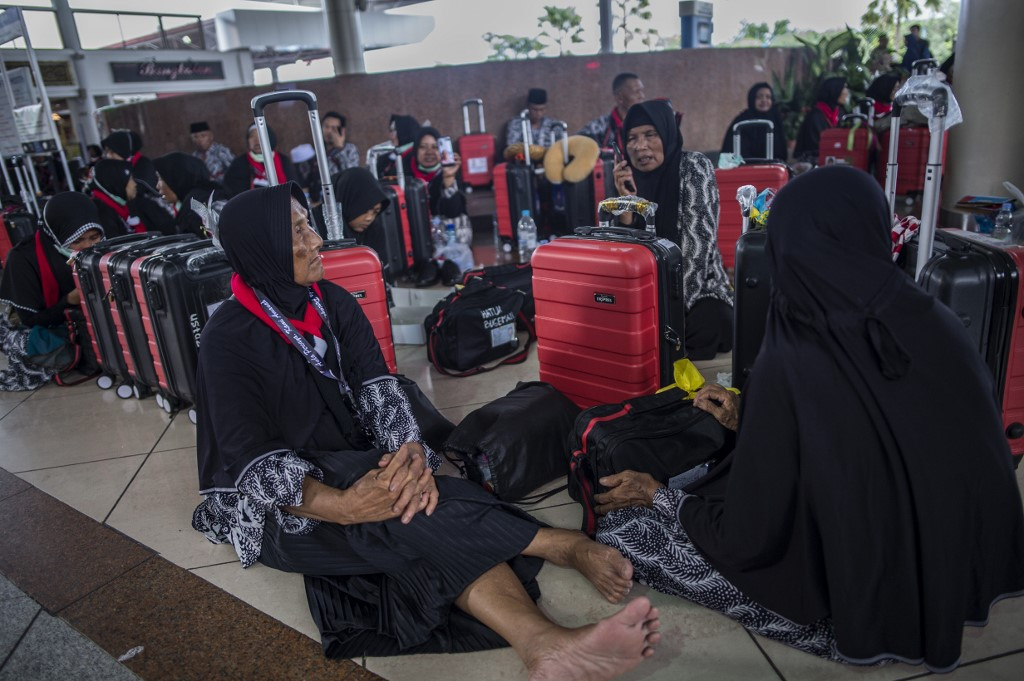Popular Reads
Top Results
Can't find what you're looking for?
View all search resultsPopular Reads
Top Results
Can't find what you're looking for?
View all search resultsBanning or wooing travelers in time of novel coronavirus
Any preventive efforts are always smarter than battling a virus that has already at large and infecting people — even without being detected.
Change text size
Gift Premium Articles
to Anyone
O
ur hearts go out to our Muslim brothers and sisters who are forced to delay their dreams of traveling to the Holy Land to perform the umrah (minor haj). Saudi Arabia has temporarily banned entry into the country for foreign pilgrims and tourists from countries considered at risk to the COVID-19 coronavirus.
For many, a pilgrimage takes years of saving, long planning and absence from work. Those overcome hurdles are on top of the intangible emotional and spiritual anguish now caused by the delayed visits to the Holy Land.
The decision by the Saudi government must be applauded. It must have been a difficult one to make and it is not as easy as banning travelers from one particular country from entering its territory.
The announcement was likely made after there was a sudden increase of cases in Iran that led the World Health Organization to describe the infections as “deeply disturbing”.
Only hours before the Saudi government decided to suspend incoming foreigners, WHO confirmed that for the first time the number of new daily COVID-19 infection cases outside of China had outnumbered those inside China. WHO cited cases in countries such as Iran, Italy and South Korea.
No matter how rich the Saudis are, the decision will still sting the kingdom’s economy. The pilgrimage industry is Saudi Arabia’s second most important source of revenue after oil and gas. During the annual haj season more than 2 million Muslims from various countries enter the holy city of Mecca before going on journeys to retrace the route of Prophet Muhammad.
While it is heartbreaking to see the faces of hundreds of would-be pilgrims who are stranded in airports, uncertain of when they can resume their plans, the decision made by the Saudi government to ban incoming visitors, particularly from places where infection cases have been reported, has shown a rational approach to curbing the coronavirus.
Any preventive efforts are always smarter than battling a virus that has already at large and infecting people — even without being detected.
Back to our own backyard: A few days before Saudi Arabia’s announcement on Thursday, Indonesia’s government announced something extraordinary sure to raise the hair on the back of your neck.
Coordinating Economic Minister Airlangga Hartarto was widely quoted as saying the government is developing a strategy to address the impacts of the fast-spreading coronavirus, which has severely hit the country’s tourism sector. It has allocated Rp 10.3 trillion (US$719.4 million) for a stimulus package to be disbursed to, among others, airlines and travel agencies and to be used to provide incentives to foreign tourists.
Indonesia is not the only country in the world whose tourism and trade are affected by the COVID-19 outbreak, and since experts don’t know everything about the latest virus, we cannot keep boasting about having “zero cases” so far. There have been confirmed cases among individuals who had no contact or previous travel to places where there were infections.
So in these times, is it even wise for the government (and other governments) to encourage people to travel the world in the name of saving revenue and profits from tourism?
Isn’t it too risky? Can the government or the tourism authority guarantee that tourists will not catch the virus?
Also, is it even wise to spend state money on foreign influencers to woo visitors?
Sunbathing on a pristine white sandy beach or chilling in a tea plantation house from the colonial era may sound tempting, but it is hardly on anyone’s bucket list at the moment. People would likely put traveling and holidaying on the bottom of their wish lists.
Perhaps, in the mind of the country’s tourism authority, officials thought they could tap into potential profits by being a virus-free country able to offer weekend getaways.
Instead of commissioning foreign influencers (really Indonesia?) and giving incentives to the already established airlines, hospitality companies and travel agents, the funds could go to finance outbreak-related preparedness, including making sure that Indonesia has more biosecurity laboratories, as part of the efforts to ensure this country has the ability and competence to produce vaccines.
The list could really go on.
On Jan. 30, WHO declared the outbreak an international public health emergency and has been urging countries to prepare screening, isolation wards and public education campaigns.
As WHO chief Tedros Adhanom Ghebreyesus said: “The virus has pandemic potential. This is not a time for fear. This is a time for taking action to prevent infection and save lives now.”
This is not a time for raking in profits and risking lives.
***
Freelance journalist











